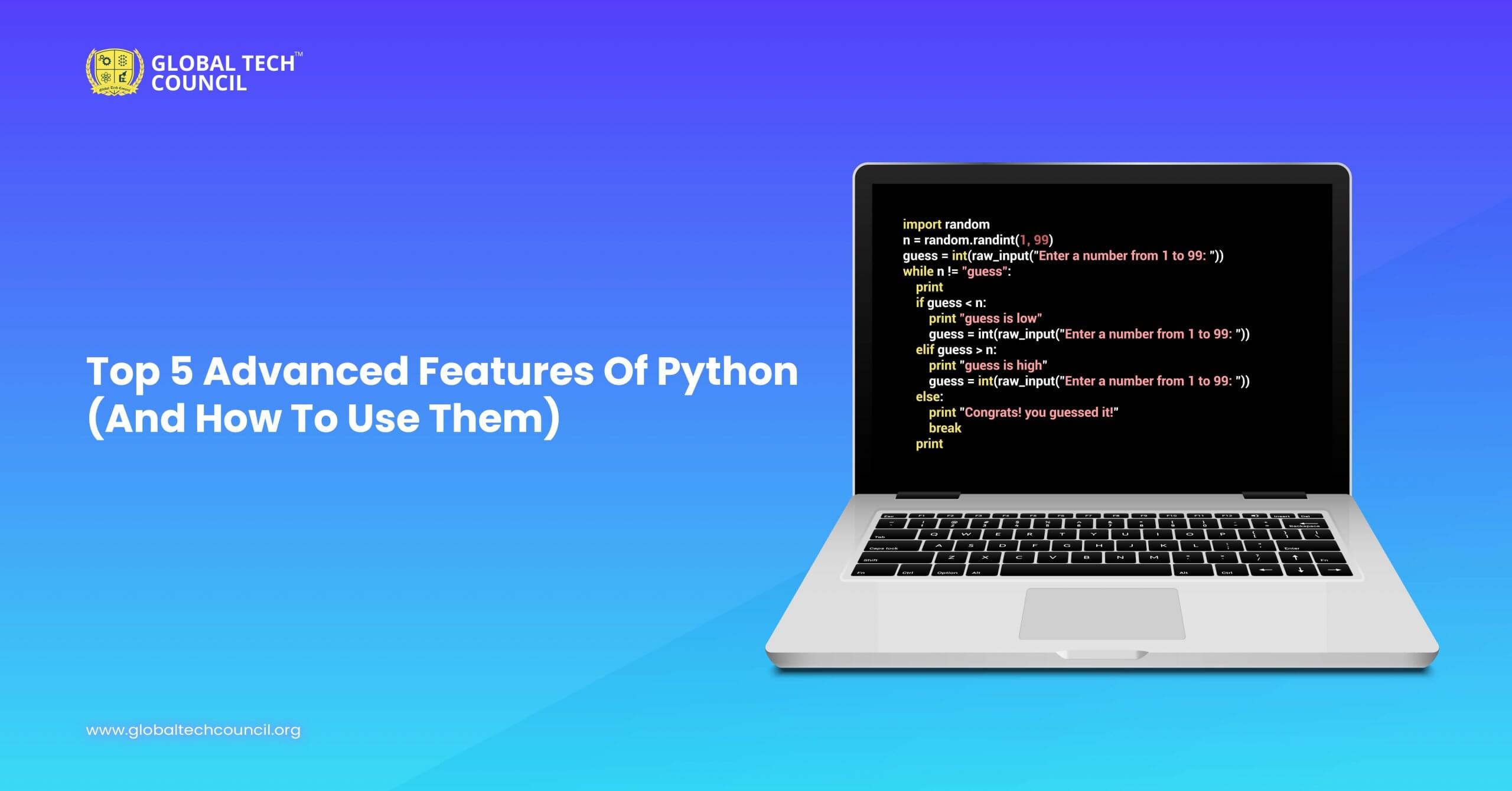
Python – what a simple yet powerful language! With easy syntaxes but complex features, it has high-level data structures. Besides Windows and Linux, it also works with platforms like Mac, Pi, and Raspberry.
Although being a relatively straightforward programming language, Python has some advanced features you may not know about. Moreover, you can simultaneously use one or more of these features to solve a problem. You might have learned some of them in a Python certification course. If not, we are here to guide you through these features.
You can discover and learn any feature through ample coding experience or a Python programming certification. However, if you are looking for a quick way to master Python, this is the perfect place to start. In addition to explanations, we have also added examples for a better understanding.
Maps Function
The map() function, when applied to a sequence of iterable (like a list or a dictionary), returns a map object (iterator). Additionally, the function works on every entity iterable by the Maps function.
It is an easy way to perform such operations. Therefore, it is sometimes taught in Python crash courses. Most importantly, you can use this function with other Python functions, given that they are compatible.
Syntax – map(fun, iter)
Fun: a function to which the map passes each element of the given iterable.
Iter: an iterable which is to be mapped.
Example Code –
# Python program to demonstrate the working of the map.
# Return double of n
def addition(n):
return n + n
# We double all numbers using map()
numbers = (3, 5, 2, 7)
result = map(addition, numbers)
print(list(result))
Output –
[6, 10, 4, 14]
Lambda Function
Lambda is an anonymous function in the Python programming language. Generally, we define Python functions using the keyword “def” followed by the function name. On the contrary, Lambda functions use the keyword “lambda.”
Lambda is used to perform easy calculations or operations. Further, we can also use it for list comprehension.
Syntax – lambda arguments: expression
Example Code –
# Example of lambda function using if-else
Max = lambda a, b : a if(a > b) else b
print(Max(1, 2))
Output – 2
This function can have multiple numbers of arguments. However, it must contain only one expression. Lambda is a handy function for data scientists. You can learn it through a Python crash course offered by reliable sources.
Generators
It is lengthy and time-consuming to build iterables that iterate Python objects. Hence, we use Generators to make the process easier. Besides simplifying the code, it is also memory efficient.
Generators declare a function that works the same as an iterator. We use the keyword “yield.” To understand the working of Generators and Iterators, you can sign up online and enroll in some of the best Python certification courses.
Syntax – Same as list comprehensions.
Example Code –
# A simple generator function
def my_func():
n = 1
print(‘First Number’)
# Generator function contains yield statements
yield n
n += 1
print(‘Second Number ‘)
yield n
# Using for loop
for number in my_func():
print(number)
Output –
First Number
1
Second Number
2
Filtering
Filter () is a function similar to Maps. It is built-in and applies a function to a tuple, list, or dictionary. However, the difference between Maps and Filtering is that the latter returns an iterable with only the items in sequence for which the function returns True. That is, it removes the items which evaluate as false.
A Python certification can be helpful if you wish to learn more about Filter ().
Syntax – filter(function, sequence)
Example Code –
# a list contains both even and odd numbers.
seq = [0, 1, 2, 4, 5, 8, 17]
# result contains odd numbers of the list
result = filter(lambda x: x % 2 != 0, seq)
print(list(result))
# result contains even numbers of the list
result = filter(lambda x: x % 2 == 0, seq)
print(list(result))
Output –
[1, 5, 17]
[0, 2, 4, 8]
Python Itertools
The itertools is a collection of tools. It is a fast and memory-efficient tool that can work independently as well as in combinations to form iterator algebra. Additionally, we use this module to handle iterators. An iterator is used for loops, lists, dictionaries, and tuples.
We use __iter__() and __next__() methods.
You can find different types of iterators in this module, for instance:
- Terminating iterators
- Infinite iterators
- Combinatoric iterators
Python programming certifications will teach you how to perform various iterator operations. Most importantly, you will learn to effortlessly execute multi-line functions and complex list comprehensions.
Example Code 1 – Return an iterator from a tuple, and print each value:
mytuple = (“Apple”, “Banana”, “Kiwi”, “Cherry”, “Blueberry”)
myit = iter(mytuple)
print(next(myit))
print(next(myit))
print(next(myit))
print(next(myit))
print(next(myit))
Output –
Apple
Banana
Kiwi
Cherry
Blueberry
Example Code 2 – Creating strings as a sequence of characters
mystr = “BANANA” “APPLE”
myit = iter(mystr)
print(next(myit))
print(next(myit))
print(next(myit))
print(next(myit))
print(next(myit))
print(next(myit))
print(next(myit))
print(next(myit))
print(next(myit))
print(next(myit))
print(next(myit))
Output –
B
A
N
A
N
A
A
P
P
L
E
Conclusion
Python is one of the basic prerequisites for any advanced course or a job in the IT sector. Not only is the programming language easy, but it is also handy for developers. Moreover, you can improve your coding skills and use the knowledge to improvise other programming languages too.
For polishing your coding skills, Python is a great practice tool. Its practical uses include data analytics and visualization, web development, and SEO. With necessary Python certification, you can work as a Machine Learning (ML) engineer or AI engineer.
You can learn its fundamentals through a Python crash course. However, most employers require that you have an understanding of its advanced features as well. To master these advanced features, you can enroll for long-term Python programming certification courses online.
Please refer to GLOBAL TECH COUNCIL for more details regarding Python and other programming languages. Here you can also find informative technology content.